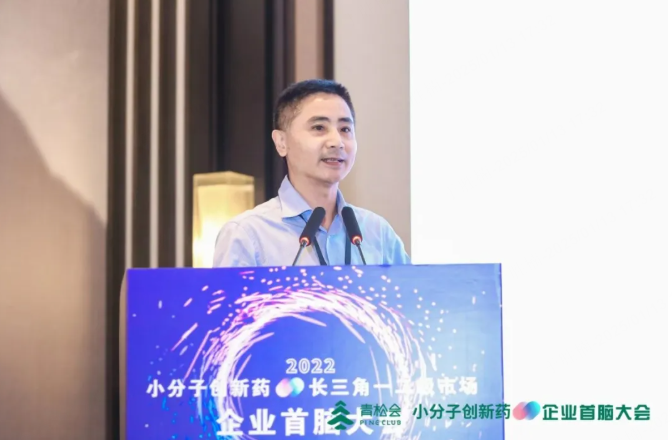EN
2022-09-02
On August 27, the Small Molecule Innovative Drugs Yangtze River Delta Primary and Secondary Market Corporate Leaders Closed-door Meeting, co-hosted by Pineclub and Genhouse, was successfully held in Suzhou. At the meeting, Junlin Wang, founder and chairman of UnionClin, delivered a keynote speech titled "Challenges and Solutions in Early Clinical Studies of Innovative Anti-Tumor Drugs".
As a veteran who has been deeply involved in the pharmaceutical industry for more than a decade, Junlin Wang once served as the head of a well-known pharmaceutical company. In 2017, known as the "First Year of Innovative Drugs", he resolutely chose to start anew and founded UnionClin to focus on providing end-to-end full-process clinical study services for anti-tumor new drug development. Since the establishment, he has led the team to provide CRO and SMO services to over a hundred pharmaceutical companies.
Junlin Wang's rich accumulation of resources and experience in the field of innovative drug research and development has given him deeper insights into clinical studies, especially in the oncology field. The following are the highlights of his speech, with some content abridged:
"According to official data from the CDE, from 2019 to 2021, over 300 early clinical studies of innovative anti-tumor drugs were registered in China, with 80 to 100 pivotal clinical studies. Currently, the ratio of early clinical to pivotal clinical studies is about 3:1. In the future, accompanying innovative research, this ratio may expand to 5:1 or even 10:1," Junlin Wang considered that, "Developing innovative drugs is a matter of life and death, and the probability of failure is greater than that of success. Therefore, during the early trial process, trying is more important than pursuing success."

Junlin Wang, Founder and Chairman of UnionClin
Photo of the Summit of Small Molecule Innovative Pharmaceutical Enterprises
Facing an increasing number of new technologies, new targets, and new molecules, differentiated layouts are crucial for innovative drug research and development. This also raises higher requirements for the foresight and differentiation of trial protocol design. It takes at least five years from the start to the success of a drug's clinical study. Taking oncology drugs as an example, issues such as how to ensure the drug's therapeutic position and competitive advantage in overseas markets after five years must be considered.
In Junlin Wang's view, for a clinical study of a new oncology drug to succeed, it needs to possess several key points: First, finding the right principal investigator (PI) is half the success; the PI's emphasis on the project may be more important than any other factor. Second, early clinical stages determine the success or failure of a new drug; early stages require thorough research and sufficient evidence to undertake pivotal clinical studies. Third, the processes at research centers must support rapid changes. Fourth, an integrated and highly efficient professional service team to achieve multidisciplinary collaboration, including medicine, pharmacology, statistics, imaging, etc. Fifth, efficient patient recruitment.
In addition to explicit demands, the implicit demands beneath the surface are equally worthy of attention. Under the leadership of Junlin Wang, UnionClin continuously develops and introduces innovative tools and methods, deepening cooperation with research centers and enhancing the operational efficiency of clinical studies from the source. Currently, Youlin has deployed automated data collection systems and digital process management systems for Phase I wards in over 30 hospitals and has configured dedicated CRC (Clinical Research Coordinator) teams for more than 20 research centers, with all CRC personnel allocated according to the functional modules of the research centers. Youlin has also independently developed patient recruitment tools to better match patients willing to participate in trials with projects, shortening the enrollment cycle.
Junlin Wang frankly admitted that the issues inherent to the drugs themselves cannot be resolved, but many problems in clinical study protocols and execution can be addressed through resource integration to obtain an overall optimal solution, thereby enhancing quality and accelerating every phase in clinical research for drug development.